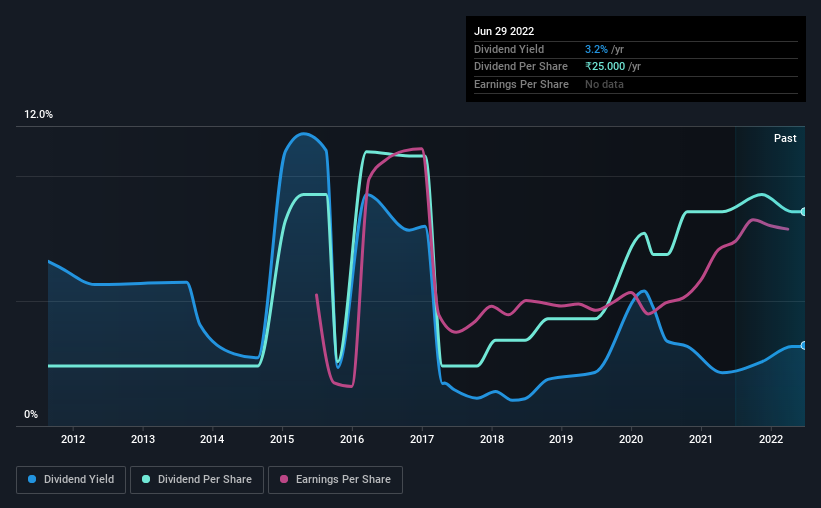Sasken Technologies' (NSE:SASKEN) Dividend Will Be Reduced To ₹13.00
Sasken Technologies Limited's (NSE:SASKEN) dividend is being reduced to ₹13.00 on the 16th of August. However, the dividend yield of 3.2% is still a decent boost to shareholder returns.
View our latest analysis for Sasken Technologies
Sasken Technologies' Dividend Is Well Covered By Earnings
While it is great to have a strong dividend yield, we should also consider whether the payment is sustainable. However, Sasken Technologies' earnings easily cover the dividend. As a result, a large proportion of what it earned was being reinvested back into the business.
Looking forward, earnings per share could rise by 12.1% over the next year if the trend from the last few years continues. Assuming the dividend continues along recent trends, we think the payout ratio could be 32% by next year, which is in a pretty sustainable range.

Dividend Volatility
The company has a long dividend track record, but it doesn't look great with cuts in the past. The first annual payment during the last 10 years was ₹7.00 in 2012, and the most recent fiscal year payment was ₹25.00. This works out to be a compound annual growth rate (CAGR) of approximately 14% a year over that time. Dividends have grown rapidly over this time, but with cuts in the past we are not certain that this stock will be a reliable source of income in the future.
The Dividend Looks Likely To Grow
With a relatively unstable dividend, it's even more important to evaluate if earnings per share is growing, which could point to a growing dividend in the future. We are encouraged to see that Sasken Technologies has grown earnings per share at 12% per year over the past five years. Sasken Technologies definitely has the potential to grow its dividend in the future with earnings on an uptrend and a low payout ratio.
We Really Like Sasken Technologies' Dividend
It is generally not great to see the dividend being cut, but we don't think this should happen much if at all in the future given that Sasken Technologies has the makings of a solid income stock moving forward. Reducing the amount it is paying as a dividend can protect the company's balance sheet, keeping the dividend sustainable for longer. All in all, this checks a lot of the boxes we look for when choosing an income stock.
It's important to note that companies having a consistent dividend policy will generate greater investor confidence than those having an erratic one. Still, investors need to consider a host of other factors, apart from dividend payments, when analysing a company. Taking the debate a bit further, we've identified 2 warning signs for Sasken Technologies that investors need to be conscious of moving forward. If you are a dividend investor, you might also want to look at our curated list of high yield dividend stocks.
New: Manage All Your Stock Portfolios in One Place
We've created the ultimate portfolio companion for stock investors, and it's free.
• Connect an unlimited number of Portfolios and see your total in one currency
• Be alerted to new Warning Signs or Risks via email or mobile
• Track the Fair Value of your stocks
Have feedback on this article? Concerned about the content? Get in touch with us directly. Alternatively, email editorial-team (at) simplywallst.com.
This article by Simply Wall St is general in nature. We provide commentary based on historical data and analyst forecasts only using an unbiased methodology and our articles are not intended to be financial advice. It does not constitute a recommendation to buy or sell any stock, and does not take account of your objectives, or your financial situation. We aim to bring you long-term focused analysis driven by fundamental data. Note that our analysis may not factor in the latest price-sensitive company announcements or qualitative material. Simply Wall St has no position in any stocks mentioned.
About NSEI:SASKEN
Sasken Technologies
Provides product engineering and digital transformation services in India, North America, Europe, and internationally.
Flawless balance sheet with slight risk.
Similar Companies
Market Insights
Weekly Picks


Crazy Undervalued 42 Baggers Silver Play (Active & Running Mine)


Fiducian: Compliance Clouds or Value Opportunity?

Willamette Valley Vineyards (WVVI): Not-So-Great Value
Recently Updated Narratives

Watch Pulse Seismic Outperform with 13.6% Revenue Growth in the Coming Years

Significantly undervalued gold explorer in Timmins, finally getting traction

Moderation and Stabilisation: HOLD: Fair Price based on a 4-year Cycle is $12.08
Popular Narratives


MicroVision will explode future revenue by 380.37% with a vision towards success


NVDA: Expanding AI Demand Will Drive Major Data Center Investments Through 2026





